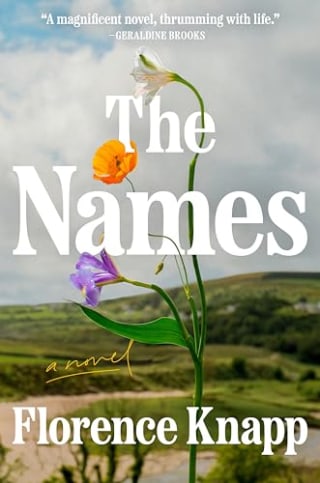What’s in a name? Jenna Bush Hager’s May 2025 Read With Jenna book club pick tries to answer the age-old question.
“The Names” by Florence Knapp, publishing on May 6, follows a mother named Cora, who is going to register her son’s birth. Through three separate storylines in which she gives her son three different names, readers will find out how his life drastically differs with each name.
“We watch these three different realities take place over a lifetime,” Jenna says. “We watch a family who comes together, grows apart, and we meet this boy whose name, in three different ways, predicts who he will be. It’s a book about second chances. It’s a book about family, it’s a book about hope.”
Knapp’s debut novel shows what happens to the boy when he’s named Bear, Julian and Gordon, and how his life is shaped by his name over the course of more than three decades.
“I think you will love it, it is so beautifully written. I read somewhere that this may be a classic, and I kind of agree,” Jenna adds. “I hope you’ll read it with us.”
“The Names” by Florence Knapp
Knapp tells TODAY.com “The Names” begins when Cora’s husband Gordon is intending for her to name their child after him, following a long-standing family tradition.
“But as she gets nearer to nearer to the registrar’s office, she’s questioning whether that can be right when he’s this really difficult, awful man,” Knapp says.
“The novel then splits off into three different narratives, depending on the name she does give him, and it follows each version of their life across 35 years, and looks at how a single decision, like the name that we give to a child, can spark so many infinite possibilities.”
While “The Names” is Knapp’s debut novel, she’s previously written a nonfiction book about a method of quilt-making, and she says she’s been writing fiction longer than she’s been quilting.
“I think I first started writing a novel in 1999, when I was 21, and and it’s kind of been there in the background the whole time, but more as a secret thing,” she says.
Knapp says she worked on a novel that didn’t get published before she started writing what would become “The Names” after interviewing a the granddaughter of a man who used tiny pieces of fabric to make enormous quilts.
“As I was hanging up the call, I kind of thought, ‘Oh, his name’s Albert Small,'” she says. “I think it was because I’m really interested in quilting, but for some reason that resonated with me more. I think at that point I thought, ‘Oh, it would be really interesting to write about, in fiction terms, how the name we’re given could shape the course of a person’s life.'”
Knapp says she’s always been interested in the things that shape people — from their upbringing or more fate-like instances — as well as the theory of nominative determinism, or that a person’s name can influence their interests, and even their career choice.
“The name we’re given, we’re given that right at the start of our lives and and we carry it through life with us,” Knapp says. “But it’s actually chosen by someone else, which feels like a really odd thing in some ways, and then it feels like it often goes out into the world ahead of us.”
“So people will hear it before they meet with us, and probably bring a whole load of their own assumptions to that. It might influence whether we’re get invited in for a job or meet a prospective partner or something like that,” she adds. “But then I was also interested in how it might shape our own sense of self.”
So enter Bear, Julian and Gordon. Knapp says she wanted to pick at least one more traditional name that could be handed down for generations, but that she was most interested in the associations that people could bring to each name.
“With Bear, I wanted a name that felt like it had space for the child to kind of grow into,” she says. “And the reaction to him would be so instantly and totally charmed and delighted by this boy called Bear.”
Knapp says she’s always been fond of family sagas, although she laughs as she admits that she dislikes the term itself.
“They’re some of my favorite books, the ones look at family,” she says. “I guess that I am really interested in people and the things that make us us, and there’s nothing that makes us who we are than our upbringing and the people we’re surrounded by.”
Knapp, who has two children of her own, says her kids haven’t asked about the meaning of their own names since reading her book, but that she was delighted that they picked it up.
“I wasn’t necessarily expecting that they would read it, but they both wanted to — my daughter’s actually read it twice,” she says. “That’s been one of the highlights of having my book published, actually, because of my children’s responses to it.”
As for which of the three versions of the main character ended up the best? Knapp spent the entirety of the book deciding.
“The question I was left asking as its writer was thinking about which was the better life. My own answer to that changes from day to day, and to me, that feels really hopeful. Because I think it at the outset, it looks like there’s going to be some clear winners and losers in terms of who had the easier upbringing, and actually, to get to the end and feel like, actually, I’m not sure who did. That feels, to me, really hopeful.”




